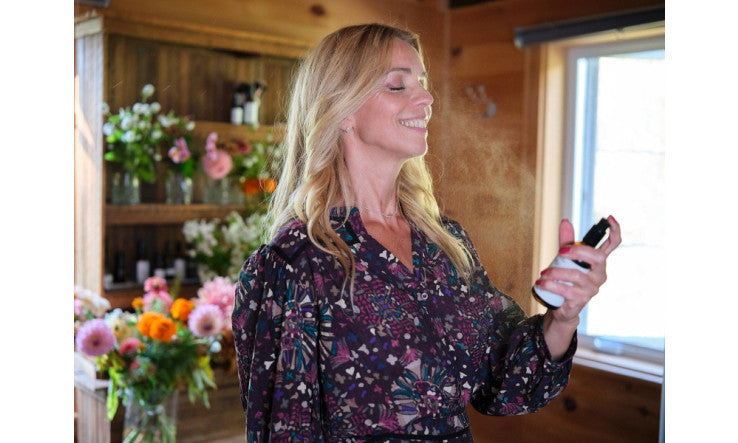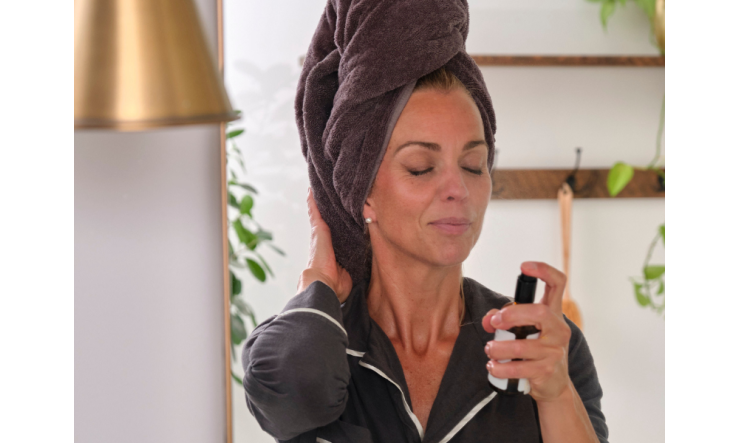With its icy temperatures and tenacious viruses, winter puts our immunity and well-being to the test. Fortunately, essential oils offer natural and effective solutions to strengthen your defenses, soothe seasonal ailments, and restore your energy. Antiviral, immunostimulant, and even purifying, these precious allies can transform your winter routine. In this article, discover how to use essential oils to get through winter, with practical advice, simple recipes, and essential precautions. Whether you're a novice or an aromatherapy enthusiast, stock up on tips for a peaceful and protected winter!
Important Warnings: Essential oils are powerful and should be used with caution. Consult a professional for personalized use, especially if you are pregnant, breastfeeding, have children, or have a medical condition.
7 essential oils to get you through the cold season
Ravintsara: Essential for strengthening immunity
When winter sets in with its viruses and colds, Ravintsara (Cinnamomum camphora) essential oil becomes a valuable ally to support your immune system and speed up recovery in case of infection. Naturally antiviral and immunostimulant, it can be used both for prevention and active support.
Thanks to its biochemical composition, Ravintsara essential oil penetrates the lipid membrane of infected cells, thus stopping the multiplication of viruses. This mechanism helps reduce the duration and intensity of winter infections, while strengthening your natural defenses.
Practical advice:
- As a preventative measure: Apply 2 pure drops to your wrists every morning (1 drop diluted with vegetable oil for children over 3 years old), rub them together, and breathe deeply. Repeat this ritual for 10 days.
- Diffusing: Pour 6 drops into a diffuser, morning and evening, to purify the air and prevent the spread of viruses.
- For cutaneous application: Mix 2 drops with a few drops of vegetable oil (such as sweet almond or jojoba oil) and apply to the chest and upper back at the first signs of fatigue or cold.
- Internally: Dilute 1 drop in a capsule with a vegetable oil, to be taken 3 times a day for 7 days, only for adults and after medical advice.
- Precautions: Prohibited for pregnant women under 3 months and breastfeeding women - Prohibited for children under 3 years old - Dilute with a vegetable oil - Not recommended for people with epilepsy or those suffering from asthma without medical advice.
Eucalyptus radiata: Respiratory decongestant
When winter arrives, stuffy noses, congestion, and respiratory irritations become common. Eucalyptus radiata essential oil is your natural ally for regaining clear breathing thanks to its decongestant and expectorant properties. Rich in 1,8-cineole, it works effectively to clear the airways and improve your comfort.
Practical advice:
- Direct Breathing: Apply 2 to 3 drops to a tissue and breathe in several times a day, or inhale directly over the bottle for a quick action to clear the nose.
- Inhalation: Add 1 drop of Eucalyptus radiata to a bowl of hot water. Place a towel over your head and inhale deeply for 5 to 10 minutes to relieve a stuffy nose.
- Home Spray: Mix 10 drops in 100 ml of water in a spray bottle for a purifying spray to spray around your home.
- Topical application: Dilute 1 drop in a carrier oil (such as jojoba oil) and apply to the chest to soothe the respiratory tract.
- Precautions: Prohibited for pregnant and breastfeeding women and young children under 3 years old - Dilute with a vegetable oil - Not recommended for people with asthma without medical advice.
Lemon: To boost immunity and purify the air
Winter is a time when our immune system is put to the test. Lemon essential oil (Citrus limon) is a valuable ally for strengthening your natural defenses and cleaning up your environment. Rich in limonene, it is renowned for its antiseptic, immunostimulating, and purifying properties, making it a must-have for dealing with the ailments of the cold season.
Practical advice:
- Boost immunity: Dilute 1 drop in a spoonful of honey or hot herbal tea and take this mixture every morning for 10 days.
- Diffusion: Add 5 drops to a diffuser to purify the air and bring a touch of freshness to your home. Combine with Ravintsara or Eucalyptus radiata for a stronger synergistic effect.
- Home Care: Mix 10 drops in 100 ml of water in a spray to clean surfaces and naturally deodorize your space.
- Precautions: Not suitable for pregnant women under 3 months - Not suitable for children under 1 year - Dilute before applying to the skin - Do not apply to the skin before sun exposure, as lemon oil is photosensitizing.
Tea Tree: Essential for soothing sore throats
When winter infections set in, Tea Tree essential oil (Melaleuca alternifolia - Tea Tree) proves to be a valuable ally. Known for its powerful broad-spectrum antibacterial and antiseptic properties, it is ideal for relieving sore throats, soothing irritations, and minor skin infections. Thanks to its high content of terpinen-4-ol, Tea Tree is a must-have for winter care.
Practical advice:
- Sore throat: Dilute 1 drop in a spoonful of honey and let it melt in your mouth to soothe irritations (adults only). You can also apply a drop of Tea Tree essential oil with a few drops of vegetable oil and massage the throat.
- Mouthwash: Mix 1 drop in a glass of warm water. Gargle to relieve sore throats (without swallowing).
- Topical application: Apply 1 drop diluted in a carrier oil (such as jojoba oil) directly to a blemish or cold sore for targeted action.
- Precautions: Prohibited for pregnant women under 3 months - Prohibited for infants under 3 months - Dilute with a vegetable oil to avoid irritation on damaged or hypersensitive skin.
Thyme thymol: Powerful anti-infective
Among the essential oils essential for winter, Thymol Thyme (Thymus vulgaris ct thymol) stands out for its exceptional antibacterial and antifungal action. Ideal for respiratory tract infections and digestive disorders, it acts as a real natural shield thanks to its active compounds, particularly phenols. This oil is reserved for adults.
Practical advice:
- Application for immunity: Mix 1 drop with 20 drops of vegetable oil and massage into the lower back every morning for 4 days.
- For the bronchi: Dilute 1 drop in 20 drops of vegetable oil and apply to the soles of the feet, 3 times a day for 5 days.
- Diffusion: Combine 2 drops of Thyme with thymol with 4 drops of Ravintsara and 2 drops of Lemon for an effective synergy against viruses.
- Precautions: Not for pregnant or breastfeeding women - Not for children under 12 years old - Dilute before applying to the skin - Not for people with liver disease. Always diffuse for a limited period in a well-ventilated room, sparingly and diluted with other essential oils - For internal use, mix with a vegetable oil and Lemon essential oil to protect the liver, for a maximum of 5 days.
Niaouli: The ally for better breathing
Niaouli essential oil (Melaleuca quinquenervia) is a valuable ally during winter, particularly for respiratory problems and discomfort related to an irritated throat. Thanks to its composition rich in 1,8-cineole and its antiviral, expectorant and immunostimulant properties, it helps clear the respiratory tract and soothe seasonal ailments.
Practical advice:
- Nasal decongestion: Apply 1 drop diluted in a vegetable oil to the wings of the nose, up to 3 times a day, for 4-5 days.
- Inhalation: Mix 1 drop of Niaouli and 1 drop of Eucalyptus radiata in a bowl of hot water. Inhale under a towel to clear the bronchi.
- Local application: Dilute 2 drops in a small amount of vegetable oil, then massage the neck or upper chest to soothe irritation.
- Precautions: Not recommended for pregnant or breastfeeding women - Not recommended for children under 3 years old - Dilute with a vegetable oil - Avoid prolonged use without medical advice, especially in people with a history of respiratory illnesses. Not recommended for people with estrogen-dependent pathologies.
Scots Pine: To boost energy
Winter can sometimes be accompanied by intense fatigue and breathing difficulties. Scots Pine (Pinus sylvestris) essential oil, known for its invigorating and revitalizing properties, is ideal for boosting your energy and improving your respiratory comfort. Thanks to its composition rich in alpha-pinene, it offers a stimulating, decongestant, and purifying action.
Practical advice:
- To combat fatigue: Dilute 1 drop in a small amount of vegetable oil and massage the lower back (at kidney level) morning and noon for 7 days.
- Diffusion: Add 6 drops to a diffuser to purify the air and boost your vitality.
- As an invigorating bath: Mix 5 drops in a neutral bath base and enjoy an energizing moment (adults only).
- Caution: Not for pregnant or breastfeeding women - Not for children under 6 years old - Dilute before applying to the skin. Not recommended for asthmatics - Do not use for a prolonged period without consulting a professional.
Additional Recipes & Tips
In winter, essential oil synergies offer effective solutions to relieve seasonal ailments, revitalize your energy, and purify your environment. Here are some simple and tailored recipes to help you get the most out of essential oils while enjoying their benefits.
Decongestant and energizing inhaler stick
Clear your stuffy nose while boosting your energy with this perfect winter synergy.
Ingredients :
- 4 drops of Ravintsara essential oil
- 4 drops of Eucalyptus radiata essential oil
- 4 drops of lemon essential oil
Preparation :
- Soak the wick of an inhaler stick with essential oils. Carefully close the stick so that it is airtight.
Use :
- Inhale deeply 2 to 3 times a day to clear your airways and boost your vitality.
General precautions:
- Use this inhaler only occasionally and keep it out of reach of children.
Synergy to lower the temperature
Ingredients :
- 2 drops of Eucalyptus radiata essential oil
- (Adult option only: 1 drop of Peppermint essential oil)
- A few drops of jojoba vegetable oil
Preparation :
- Mix the essential oil drops with the vegetable oil in your palm. Rub your hands together to evenly distribute the mixture.
Use :
- Apply this mixture to the soles of your feet, massaging gently. Repeat up to 3 times a day if necessary.
Precautions:
- Do not use in a bath. Do not apply directly to damaged skin or to children under 6 years of age without medical advice. Consult a healthcare professional.
Purifying spray for a healthy interior
Purify the air in your home and enjoy a fresh and invigorating atmosphere.
Ingredients :
- 10 drops of Eucalyptus radiata essential oil
- 5 drops of lemon essential oil
- 100 ml of water
- 1 glass spray bottle
Preparation :
- Pour water into the spray bottle. Add the essential oils. Shake before each use.
Use :
- Spray in rooms of your home, especially bedrooms and living room, to purify the air and drive away viruses.
- Repeat 1 to 2 times a day.
Precautions:
- Do not spray directly onto textiles or sensitive surfaces. Shake well before each use to ensure the mixture is evenly distributed.
Revitalizing application to counter fatigue
Regain energy by stimulating your body with this invigorating synergy.
Ingredients :
- 1 drop of Scots Pine essential oil
- 1 drop of Ravintsara essential oil
- 1 tablespoon of vegetable oil (sweet almond or jojoba)
Preparation :
- Mix the essential oils with the carrier oil in a small container. Warm the mixture slightly between your hands before applying.
Use :
- Apply to the lower back (kidney area) morning and noon for 7 days for an energizing effect.
Precautions:
- For adult use only. Do not use on irritated or damaged skin. Perform a patch test before application.
General precautions for the use of essential oils
- Specific Diffusion Precautions: Do not diffuse for more than 30 minutes per session to avoid saturating the air. Use a diffuser appropriate for the size of your room. For some essential oils, diffuse in lesser proportions with other essential oils.
- Dilution: Dilute essential oils before skin application to avoid irritation.
- Tolerance test: Before use, carry out a skin tolerance test by applying a small amount of the diluted synergy to the inside of the elbow and wait 24 hours to check for an allergic reaction.
- Do not use in children, pregnant or breastfeeding women without medical advice: It is imperative to consult the essential oils sheet and consult a health professional before any use in these specific cases.
- Precautions for medical conditions: People suffering from chronic illnesses (asthma, epilepsy, hypertension, etc.) should consult their doctor before using essential oils, as some may have adverse effects or be contraindicated with their treatment. Your doctor is the only primary player in your health.
- Beware of photosensitizing oils: Some essential oils, such as citrus oils (lemon, bergamot, grapefruit), can cause skin burns or spots if exposed to the sun after application. Do not use them before direct sun exposure.
- Avoid mucous membranes and eyes: Essential oils can cause severe irritation. In case of accidental contact, rinse thoroughly with a carrier oil, not water. Consult your doctor.
Essential oils offer natural and effective solutions to boost your immunity, purify the air, and combat winter ailments. From Ravintsara to prevent infections to Lemon to purify the environment, each oil provides specific benefits for your well-being. With simple recipes like the decongestant inhaler or the purifying spray, you can easily incorporate these natural treasures into your daily routine.
Prepare to face the cold season with serenity and vitality thanks to these essential oils.
References
Sources of information (bibliography):
Arnaud Géa - Philippe Banel. Physiology and essential oils - how essential oils act on the body's different systems, Dunod Edition 2022, 768 p., ISBN: 978-2100820771
Pierre Franchomme, Roger Jolois, Daniel Pénoël. Aromatherapy Exactly: Encyclopedia of the Therapeutic Use of Aromatic Extracts. Roger Jollois Edition, August 30, 2001, 512 p., ISBN: 2-87819-001-7
Pharmacy thesis:
Alexandra Martins. Antibacterial essential oils: the example of thymus (thymus). Pharmaceutical Sciences. 2020. ⟨dumas-03230057⟩
Studies:
Peterfalvi, A.; Miko, E.; Nagy, T.; Reger, B.; Simon, D.; Miseta, A.; Czéh, B.; Szereday, L. Much More Than a Pleasant Scent: A Review on Essential Oils Supporting the Immune System. Molecules 2019, 24, 4530. https://doi.org/10.3390/molecules24244530
Sandner, G.; Heckmann, M.; Weghuber, J. Immunomodulatory Activities of Selected Essential Oils. Biomolecules 2020, 10, 1139. https://doi.org/10.3390/biom10081139
Maison Jacynthe disclaims all liability. All information contained on this page is not intended to replace justified allopathic treatment or to disregard the expertise of the medical profession. It is up to each individual to take charge of their own health, to inform themselves, and to make the necessary changes to improve their condition. Therapeutic supervision by a qualified health professional is obviously recommended.


































































Leave a comment